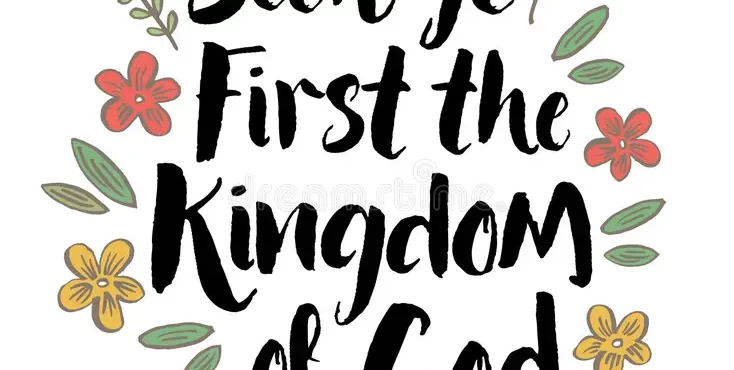Kingdom of God (Part 1)

But seek first the kingdom of God and his righteousness, and all these things will be added to you. (Matthew 6:33)
INTRODUCTION
The concept of the Kingdom of God, also known as the Kingdom of Heaven, is a central theme in Christianity. It refers to the reign or rule of God over all creation, both in the present and in the future. The Kingdom of God is not limited to a specific physical location or realm, but rather encompasses the spiritual and moral realms where God’s will is acknowledged and followed.
OLD TESTAMENT
God rules sovereignly over all His works as King. He desires His rule to be acknowledged in a bond or relationship of love, loyalty, spirit, and trust. Not surprisingly, then, one of the central themes of the Old Testament is kingdom through covenant.
This theme is revealed on the first page of Scripture, when God creates man in His own image. According to the grammar of the original text, ruling over the creatures in verse 26b is a result of creating man in the divine image. Then God said, “Let us make mankind in our image, in our likeness, so that they may rule over the fish in the sea and the birds in the sky, over the livestock and all the wild animals.”
The fact that mankind is male and female prepares us for the command to be fruitful, and the fact that mankind is the divine image prepares us for the command to rule over the creatures.
The fact that mankind is male and female in and of itself has nothing to do with the divine image. Instead, we should understand the divine image according to the background of the ancient Near East, where the setting up of the king’s statue was the equivalent of the proclamation of his dominion over the area in which the statue was erected. Accordingly, man is set in the midst of creation as God’s statue. He is evidence that God is the Lord of creation. Man exerts his rule not in arbitrary despotism but as a responsible agent, as God’s steward. His rule and His duty to rule are not autonomous; they are copies. Hence, the concept of the kingdom of God is found on the first page of the Bible. Adam begins to rule the world under God by naming everything created on the earth, just as God ruled by naming everything created in the heavens.
Careful attention must be paid to the language of the promises given to Abraham in Genesis 12 that are later incorporated into the covenant made in Genesis 15. The first promise that God gives to Abram is that He will make him a great nation. The last promise is that in Abram, all the clans or families of the earth will be blessed. God speaks of Abram as becoming a great nation through three considerations:
1. The term “nation” emphasises a people as a political entity defined by cultural, ethnic, geographical, or social factors.
2. In 12:3, the nations of the world are not called “nations” but rather “clans” or “families”. The term family emphasises a people with no real political structure and in which no system of final governmental headship or rule operates.
3. The background to Genesis 12 is chapter 11. There we have the history of Babel, where we see complete confidence and naive optimism about human achievement and effort. Man is at the centre of his world, and he can achieve anything. This philosophy comes under divine judgement. By contrast, Genesis 12 presents us with a political structure brought into being by God, with God at the centre and God as the governmental head and ruler of that system.
In other words, we have the kingdom of God brought into being by the promises to and covenant with Abraham.
When Abram’s family does become a nation, God initiates with them the Sinai covenant or law of Moses as a means for the people to be rightly related to God, to each other as God’s true humanity, and to the creation as His stewards. Therefore, the covenant is the means for establishing His Kingdom. The book of Judges proves that although each person did what was right in his own eyes, nonetheless, the Lord ruled over His people as King. Later, God rose up a king after His own heart and made a special covenant with David. The Davidic Covenant was God’s king seeking to bring the people of God, and indeed all the nations, under this rule made explicit in the covenant. Thus, the king was the mediator of the covenant and the means of extending God’s rule.
When the people failed to abide by the covenant, the prophets and the wise men were sent by God to call the people back to the covenant, the terms of God’s rule. Zephaniah, for example, based his warnings on the covenant as found in Deuteronomy.
Zephaniah 1:2: “I will sweep away everything from the face of the earth,” says the Lord, and Deuteronomy 32:22: My anger blazes forth like fire and burns to the depths of the grave. It devours the earth and all its crops, and it ignites the foundations of the mountains.
Moreover, the literacy structure of Zephaniah is chiastic, with chapter 2:11 as the centre of the book: “The nations on every shore will worship Him, everyone in its own land.” Zephaniah’s theology, then, can be summed up by the theme, kingdom through covenant.
Although the prophets sought to bring the people back to the covenant, the Sinai Covenant (the law of Moses) failed to achieve the goal of establishing God’s kingdom because it did not and, in fact, could not guarantee the obedience of the people of God. Hence, the prophets begin to speak of a new covenant in which God’s rule is guaranteed by an obedient people. As the failure of the Davidic line of kings became evident in history, the hope for a future king came more and more to the fore, along with the promise of a new creation—new humanity in a new heaven and a new earth.
The Old Testament ends (in the Hebrew Canon) with Chronicles, a book that focuses on good kings as the ideal of the future Messiah, in whom Yahweh will be truly Lord over His people and over all His creation. So the last words of the Old Testament call for a temple builder from among the people to make this hope a reality—likely the Messiah Himself.
“This is what King Cyrus of Persia says: “The Lord, the God of heaven, has given me all the kingdoms of the earth. He has appointed me to build him a Temple in Jerusalem, which is in Judah. Any of you who are his people may go there for this task. And may the Lord your God be with you!” (2 Chronicles 36:23)
STAY BLESSED!
By Dr. Joyce Aryee, the author
For further inquiries, please contact us on Tel. Nos. 0243588467 or 0268130615
Email: saltnlightministries@gmail. com
Website: saltandlightministriesgh. org













